How a mining conflict led to the political emancipation of a community in Northern Greece.
By Evi Papada
Occupied London – From the Greek Streets
Mining conflicts are increasingly surfacing globally due to complains over mines and pollution of water, soil and land occupied as well as over transport and waste disposal. The Skouries forest in Halkidiki has been at the center of a hot dispute between the mining company, Hellas Gold, a subsidiary of the Canadian mining giant Eldorado Gold and local communities. The company claims that an ambitious plan for mining of gold and copper in the area- including deforestation and open pit mining with excavation and everyday use of explosives- will benefit the region through the creation of some 5,000 direct and indirect jobs, while local residents argue that the planned investment will cause considerable damage to the environment and livelihoods, resulting to many more jobs losses in the existing sectors of the local economy (farming, pasture land, fisheries, beekeeping, food processing and tourism). The residents’ claims are supported by research conducted by various independent scientific institutions including the Aristotle University of Thessaloniki and the Technical Chamber of Macedonia. In addition to legitimacy questions underpinning the transfer of mining rights from the Greek state to the aforementioned company[1], the Environmental Impact Assessment produced by El Dorado has been found to contain gross methodological discrepancies and whilst the public consultation process could be at best described as cosmetic[2].
Local communities have been mobilizing against the expansion of mining activities long before El Dorado was given the green light to begin works on site. Small scale mining had been taking place almost uninterrupted since the end of Second World War and residents have had first experience of its impact on their livelihoods and the environment. During the 90’s the Greek government had made several attempts at reviving mining activity in the region but following an appeal by the people the State Council decided that the potential risks of the proposed investment were higher than the potential benefits for the community and the environment and operations came to a halt in 2002 . The case of mining in Halkdiki took a definite political dimension owing to the following events. In December 2003 the mines were transferred to the Greek state through a law ratified by the Greek Parliament for 11 million euros and were sold the same day and for the same price to Mr George Bololas, owner of Hellas Gold S.A for the same price and without an open procurement process. The concessions relieve the company in advance from any tax transfers and from any financial obligation concerning environmental damage resulting from previous operation of the mines. It also stipulates that the mining company has possession of all minerals in the concession granted and there are no royalties for the state.
When it comes to mining conflicts, issues of distribution of resources extracted, recognition of the community’s relationship to natural resources at stake as well as their meaningful participation in the decision making processes determine the sense of injustice, or environmental injustice[3]. In political ecology thus, mobilizations can be understood as a response to a series of disruptions in the course of ‘procedural justice’. [4] In the years to come, local village communities set up local committees and met in their homes, organized information seminars and succeeded in engaging and mobilizing the wider scientific community of Northen Greece in an attempt to collect data and exert pressure against the expansion of mining in the region. A space has been created where communities and individuals live and develop political strategies. The documentary ‘Gold in the time of crisis: the treasure of Cassandra’ released in 2012 is a rare in depth investigation of the resistance movement and offers an eloquent account of everyday resistance in praxis.[5]
Further parliamentary pressure lead to the European Commissions’ decision that the terms of the contract amount to an illegal State aid in favor of he company and ruled that the Greek government should collect 15.3 million Euros, plus interest. In addition, the EU Court of Justice decide that the Environmental Impact Assessment (EIA) produced by the company failed to meet any of the goals of the Framework Directive 60/2000/EK regarding community action in water policy and ruled it out as inadequate[6]. From the same Directive follows that mining activity can be sustainable only if it does not alter the character of a region, and developmental if it is carried out in the overall interest of society. The Greek government has appealed the decision and the case is still pending. Despite a court decision and the strong criticism it received, the EIA was finally approved and in March 2012, 4.1 square kilometers of public forest was conceded for the company to begin the implementation of the mining projects.
The way an environmental conflict fleshes out is determined by the language of valuation used by the different actors involved. The impact on the surrounding environment and livelihoods of current and future generations may be evaluated in physical or monetary terms or ‘strong’ versus ‘weak’ sustainability respectively. For the residents of Halkidiki, collective memory of village life, loss of livelihoods and the future of the coming generations are values that surpass monetary valuations of cost and benefit analysis. On the other hand, scientific valuations typically exert a cost benefit analysis monetizing environmental externalities using basic economic theory. Such externalities include social, environmental and policy impacts and data should be selected during the initial stages of the project. In the absence of original data selection, as is the case in the Halkdiki mines, a ‘benefit transfer’ methodology has been used as a ‘second to best’ approach to estimating benefits and costs of projects or policies. A robust Environmental Impact Assessment is deemed essential for such a method to be scientifically sound and it is, regrettably, absent given it has been ruled by the European Commission as not meeting set standards. The concept of ‘ecological distribution conflicts’ is often used to illustrate the incommensurable values pertained in any such conflict , while dynamics of power regarding the prevailing language of such valuations may bare significant consequences on how the conflict is negotiated in the public domain. According to a study recently conducted by a consortium of Greek universities using the aforementioned methodology, the annual environmental externalities of the mining activity in the area are estimated at 1.3M while the mining project will increase GDP by 40% and national income by 66% and will create 880 indirect and induced jobs. The benefit-cost ration is found to be 3.13 for the Greek economy[7].
A golden opportunity for growth
Regional competition for resources and pressure to curb high unemployment rates are pushing a gradual shift in European attitudes and policies towards mining. In an article published on the Reuters on line edition on July the 4th2013 titled ‘mining revival offers hope in crisis hit Europe’ an analyst of Raw Materials Group explains that growing resource nationalism in many parts of the world makes Europe more attractive from a political risk point perspective[8]. Canadian investors clearly encountered no resource nationalism when they knocked on Greece’s door: the concessions mentioned above (full possession/no royalties for the state) were granted based on a law that dates back to the Greek military Junta, and which the current government did not bother to amend.
Since 2009, Greece has been operating under the auspices of financial recovery plan, designed collectively by the IMF, European Central Bank and the European Commission. According to the signed Memorandum, the country has agreed to a multi billion bailout on the condition of implementation of structural adjustment programmes and the attraction of investment is seen the only road to growth and job creation. Given the pressures inherent in any IMF structural adjustment programmes to allow Foreign Direct Investment, it come to no surprise that the Greek government approved the questionable terms of the Environmental Impact Assessment. The paradox however still remains as the terms of the concessions made to the company leave little room for the Greek state to profit out of this investment. The scale of environmental damage and the circumstances under which this project has been licensed bare striking resemblance to many post colonial modernization projects widespread in the developing world.[9]
It is not the first time that the economic crisis is used as a pretext for the sacrifice of the environment and basic rights. So eager was the then Minister of Finance to approve the Environmental Impact Assessment and sign the investment agreement with Hellas Gold (the Greek subsidiary of Canadian based El Dorado) and so determined to follow it through, that practically no one could stand in his way. Certainly not protesting local residents, who were soon to be accused of forming and participating in a terrorist organization.
The turning point came on Oct. 21 2012 when about 2,500 protesters fought a pitched battle with more than 200 police along the forest road leading to Eldorado’s Skouries gold-and-copper deposit, arresting 14 people. Retribution came on the night of Feb. 16, when about 40 masked men invaded a Skouries work site in the forest, set fire to machinery and vehicles, and doused three security guards with fuel, threatening to burn them alive. Eldorado put the damage of the arson attack at $1-million (U.S.). Two men were arrested and another 18 are under investigation.
Evoking concerns over terrorist activity and threat to social order, police forces imposed a regime of occupation in Ierissos, conducting continuous house searches, interrogations, arrests including 16 DNA samples taken by force and without consent as well as arbitrary detentions, an Orwellian reality that residents of Ierissos and the neighboring areas were forced to experience. A 76 year old was called to testify at the local police station under accusations of ‘use of illegal violence’ during her participation at the June demonstration June 2013 blockade of the road leading to the worksite in Skouries. 35 more local residents are facing identical charges, for protests and blockades in April 2013. To make matters worst, on October 23, 2013 the National Federation of Editors Union released a statement condemning the surveillance activities of the National Intelligence Service for secretly recording conversations with national and international media regarding the events in Skouries, for the purpose of using them as evidence in court against those accused.
The local mobilization and unprecedented repression that ensued quickly found an international platform for support and solidarity through social and critical media platforms. The ‘battlefield’ ceased to be the central stage for mobilization and resistance welcomed new actors. More hybrid forms of resistance emerged, local, national and global, local protests continued along with international advocacy, lobbying etc. Consequently, police presence has been gradually withdrawing and the North Star ascended, a by private security firm guarding the site and equipment. On December 16th, 2013, 150 employees of the aforementioned security firm were fired and came to protest at the village square of Stratoni as El Dorado Gold decided to change their security provider to ‘Blackwater’, the notorious international private army known to the public through its involvement in the Iraq and Afghanistan wars. Protesters were carrying a placard writing ‘murderers of nations out of here’.
Corruption and the mainstream media
An open letter addressed to the National Federation of Editor Unions from the Coordinating Committee of affected communities wrote:
“During the last few days…..the residents of our towns and villages have been targeted by a certain part of the Media, which systematically present us as “terrorists”. Not only is televised time split unequally, but we also often see a television “reality” that is manufactured for the needs of the 8pm news. On the pulpit of tele- democracy and the government affiliated news papers, there is no mention of the repetitive violations of our human and constitutional rights, the continuous police surveillance of our personal lives, the violation of our lawyers’ rights, the abductions/citizens’ disappearance for hours at a time, the unbearable pressure to give DNA samples. The rule of law is abolished everyday in our towns and the journalists pretend they see nothing”.(sos.halkidiki fact sheet,2012)
The mainstream media tactic concerning the events and issues surrounding the investment in Skouries has been two fold. First, the vast majority of TV and written press failed to report on the organisation of events and demonstration in area or surrounding cities, which were often attended by tens of thousands, making them the largest demonstation during the histroy of austerity in Greece.
A characteristic example is the newspaper ‘Kathimerini’ reporting of the demonstration of the 9th of September 2012 and the police repression. In an article under the heading ‘Determination in the face of extremities’, the unknown author argued that the struggle against the expansion of mining activities is equivalent to the action of far right groups, characterizing protesters as’ leftist assault battalions.
Not a single journalistic account had been published or braodcasted on the greviances put forward by residents of nearby villages regarding the illicit activities of the company. Reporting has been scarce if not absent, rendering the importance of the events not news worthy. Second, mainstream media outlets have used the method of selective reporting of events, broadcasting exclusively the opinions of government and company representatives, allowing it to be adopted as the ‘dominant truth’. A reference by representatives of the Ministry of Environment about a similar mining project of El Dorado S.A in environmentally sound Finland has been continuously reported whereas reports from national and international scientific bodies regarding the devastating effects on the environment are silenced is an illustrative example of the mainstream media serving particular interests. In this way, the ‘dominant truth’ is established as the single means of interpreting events, and succeeds in presenting such an investment activity as devoid of environmental risks, safe and necessary.
The political economy of the Greek media is of great interest and relevance and it has been further scrutinized both nationally and internationally, following Greece’s financial downturn in 2009. A gradual death of mainstream Greek media that positioned critically against the Memorandum singed between Greece and the Troika (IMF, ECB, EU) gave space for the emergence of a ‘memorandum of consensus’. Not only is there greater pressure on journalists to promote austerity measures, but there has also been a massive reduction of voices diversity: 63% of political parties TV air time goes to government, while Troika representatives or journalistic accounts about them account for 57% of TV news (June-December 2013). And another astonishing figure: Greece fell from the 35th place to the 84 in Press Freedom between 2009-2013 (Smyrnaios, 2013). The attitude and stand of the Greek mainstream mass media points to interwoven relations of corruption[10]. Incidentally the owner of the biggest Media Group, DOL is Mr George Bobolas, the same person who owns Hellas Gold S.A.
Local Community strikes back
The liberal peace project of post dictatorship Greece is broken. It is beyond the scope of this document to analyze the current democratic deficit, however rampant police violence and arbitrary arrests are reported nearly on a daily basis on the few media that survived the angry grip of the establishment. All these, coupled with prohibition of assembly on major streets, marshaling of state employees, neo-nazi ressurgence and corruption at the heart of the very institutions that guarantee democratic and transparent processes are pointers to a fragile post 1974 social and political consensus. The terms for the new social contract will have to be negotiated again as the country is struggling to cope with the social and financial wreckage of austerity. The events in Skouries are but only one example of how state and media power as technology of power is creating ruptures with the everyday lives of people.
The presence and scale of activities of the mining company constitute a challenge to customary forms of community organizing and local state institutions. Local authority representatives are divided between those who support the project and sign agreements with the company and those who oppose it and join the resistance network. Land disputes and environmental hazards pose a threat to traditional forms of employment (farming, fishing etc) and different forms of popular mobilization against the mining giant as well as the decision or not to opt for employment in the mines are challenging the main constitutes of the village community, traditionally based on family and work relations. Institutional power revealed itself as ideology, under the mask of growth and the local struggle at safeguarding the environment against the activities of El Dorado transfuses itself with a struggle against an ideology that places the doctrine of ‘growth at whatever cost’ at the center of the new financial liberation dogma for debt ridden Greece.
The tactic of ‘divide and rule’, so carefully put in place by both the government and a large section of the mainstream media has not yield the expected results. The community’s response to the harassment, violations and serious legal allegations has been dynamic and continues; their everyday mobilization and repoliticization denotes resistance. When the governmental, judicial and Media institutions stand so firmly against a community then autonomous agency reclaims that vacant institutional space and introduce processes that resonate with the local experience and satisfy the needs of that particular community. The different tactics the communities use are flexible, resourceful and able to adapt against the institutionalized forms of control and coercion. On Sunday 19th of January 2014, in advance of the local election due to take place in May this year, over 3000 voters from five villages of the Aristotelis Municipality, under the banner of ‘ An initiative of Unity’ organized a secret ballot for the purpose of selecting one out of the three candidates, all active members in the movement against mining in the region, who will represent the anti mining block in the local elections. This is where autonomous agency meets with the liberal paradigm and creates what Oliver Richmond refers to as places of hybridity.[11]In other words, this is an example of a creation of a space for political emancipation.
[1] http://europa.eu/rapid/press-release_IP-08-1927_en.htm?locale=en
[2] For more information on the investment and impacts please visit http://soshalkidiki.files.wordpress.com/2012/11/impacts-of-gold-mining.pdf (in english)
[3] ibid: 162
[4] Martinez-Alier, J (2001) Mining con?icts, environmental justice, and valuation, Journal of Hazardous Material. 86, 153-170
[5] http://www.exandasdocumentaries.com/gr/documentaries/chronologically/2012-2013/330-xrysos-sta-xronia-tis-krisis-o-thisavros-tis-kassandras
[6] The Kakkavos mountain supplies water to the entire N.E. Halkidiki.The proposed mining activity will directly and irreversibly affect the region’s water resources. The EIA does not meet any of the goals of the Framework Directive 60/2000/EK – “Establishing a framework for Community action in water policy” which has been incorporated into Greek law
[7] A.Kontogianni, D.Damigos, C.Tourkolias, M.Skourtos (2012) ‘The social cost of mining: the case of gold mining in Chalkidiki’. Presented at the 3rd International Conference of Industrial and Hazardous Waste Management, Crete
[8] http://www.reuters.com/article/2013/07/04/mining-europe-idUSL5N0F92SQ20130704
[9] Watts, Michael J. (2004) Antinomies of Community: Some Thoughts on Geography, Resources and Empire, Transactions of the Institute of British Geographers, New Series, Vol. 29, No. 2 pp234-
[10] See also “Greece’s triangle of power”(Reuters Special Report 21.12.2012)
[11] Oliver Richmond, Resistance and the Post-Liberal Peace’ Millenium Journal 2010 (38) 3 pp 680
Original Page: http://blog.occupiedlondon.org/2014/01/30/skouries-a-story-of-political-emancipation/
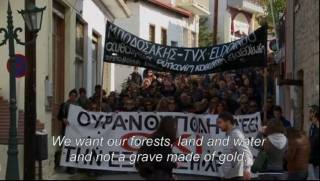
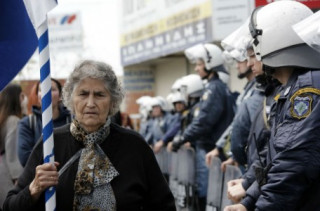
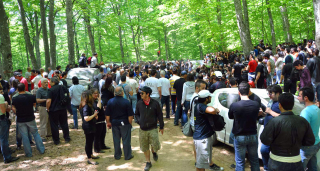
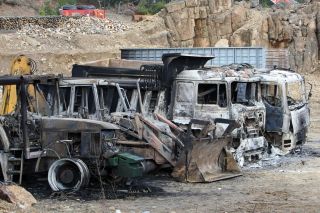
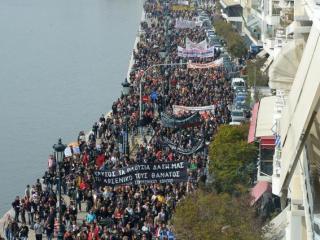
You have brought up a very wonderful points , appreciate it for the post.